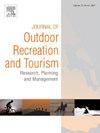Residents’ behavioral support for tourism in a burgeoning rural destination
IF 3.6
3区 管理学
Q1 HOSPITALITY, LEISURE, SPORT & TOURISM
Journal of Outdoor Recreation and Tourism-Research Planning and Management
Pub Date : 2024-10-04
DOI:10.1016/j.jort.2024.100816
引用次数: 0
Abstract
This study aimed to test a model derived from the social exchange theory and the theory of planned behavior in determining the role that antecedents play in explaining residents' behavioral support for tourism in a rapidly developing destination. Data were collected from 511 residents of McCurtain County in Oklahoma, USA, using onsite interception and online sampling strategies. Based on a two-step structural equation modeling analysis, eight out of the 10 proposed hypotheses were supported. Of the four potential predictors of residents’ attitudinal support for tourism, perceived benefits, perceived costs, and trust in local government were significant, explaining 63% of the variance in the construct. Attitudinal support, subjective norms, and perceived behavioral control then significantly explained 84% of the variance in behavioral intentions to support tourism. These intentions, in turn, significantly explained 44% of the variance in behavioral support for tourism. Implications, limitations, and future research suggestions are discussed at the close of the article.
Management Implications
Residents' support for tourism within McCurtain County in Oklahoma, USA, is not very strong mostly because residents do not feel that they can trust the government in making decisions regarding tourism and that they have limited power to contribute to tourism planning and management. To address the lack of trust in government, efforts should be made to increase transparency in tourism decision-making. This could occur through the greater inclusion of residents in planning sessions and sharing reports with the public (e.g., sharing minutes and reports via websites, radios, newspapers, etc.). The government should find ways to include more residents in tourism-related decision-making that will affect not only tourism businesses but also the community as a whole. This could look like a regular assessment of residents’ perspectives through conducting surveys, holding focus group interviews, or hosting town hall meetings.
居民对新兴乡村旅游目的地旅游业的行为支持
本研究旨在检验一个由社会交换理论和计划行为理论衍生的模型,以确定前因在解释一个快速发展的旅游目的地居民对旅游业的行为支持方面所起的作用。研究采用现场拦截和在线抽样策略,收集了美国俄克拉荷马州麦考滕县 511 名居民的数据。根据两步结构方程模型分析,提出的 10 个假设中有 8 个得到了支持。在居民对旅游业态度支持的四个潜在预测因素中,感知收益、感知成本和对当地政府的信任具有显著性,解释了该结构中 63% 的变异。然后,态度支持、主观规范和感知行为控制显著解释了支持旅游业的行为意向中 84% 的方差。而这些意向又极大地解释了旅游业行为支持中 44% 的变异。文章最后讨论了研究的意义、局限性和未来研究建议。 管理意义美国俄克拉荷马州麦考滕县的居民对旅游业的支持并不强烈,这主要是因为居民认为他们无法信任政府在旅游业方面的决策,而且他们在旅游业规划和管理方面的权力有限。为了解决对政府缺乏信任的问题,应努力提高旅游业决策的透明度。这可以通过让居民更多地参与规划会议并与公众分享报告(如通过网站、广播、报纸等分享会议记录和报告)来实现。政府应想方设法让更多居民参与到与旅游业相关的决策中来,因为这些决策不仅会影响旅游企业,还会影响整个社区。这可以是通过开展调查、举行焦点小组访谈或举办市民大会等方式对居民观点进行定期评估。
本文章由计算机程序翻译,如有差异,请以英文原文为准。
求助全文
约1分钟内获得全文
求助全文
来源期刊

Journal of Outdoor Recreation and Tourism-Research Planning and Management
HOSPITALITY, LEISURE, SPORT & TOURISM-
CiteScore
6.70
自引率
5.30%
发文量
84
期刊介绍:
Journal of Outdoor Recreation and Tourism offers a dedicated outlet for research relevant to social sciences and natural resources. The journal publishes peer reviewed original research on all aspects of outdoor recreation planning and management, covering the entire spectrum of settings from wilderness to urban outdoor recreation opportunities. It also focuses on new products and findings in nature based tourism and park management. JORT is an interdisciplinary and transdisciplinary journal, articles may focus on any aspect of theory, method, or concept of outdoor recreation research, planning or management, and interdisciplinary work is especially welcome, and may be of a theoretical and/or a case study nature. Depending on the topic of investigation, articles may be positioned within one academic discipline, or draw from several disciplines in an integrative manner, with overarching relevance to social sciences and natural resources. JORT is international in scope and attracts scholars from all reaches of the world to facilitate the exchange of ideas. As such, the journal enhances understanding of scientific knowledge, empirical results, and practitioners'' needs. Therefore in JORT each article is accompanied by an executive summary, written by the editors or authors, highlighting the planning and management relevant aspects of the article.
 求助内容:
求助内容: 应助结果提醒方式:
应助结果提醒方式:


